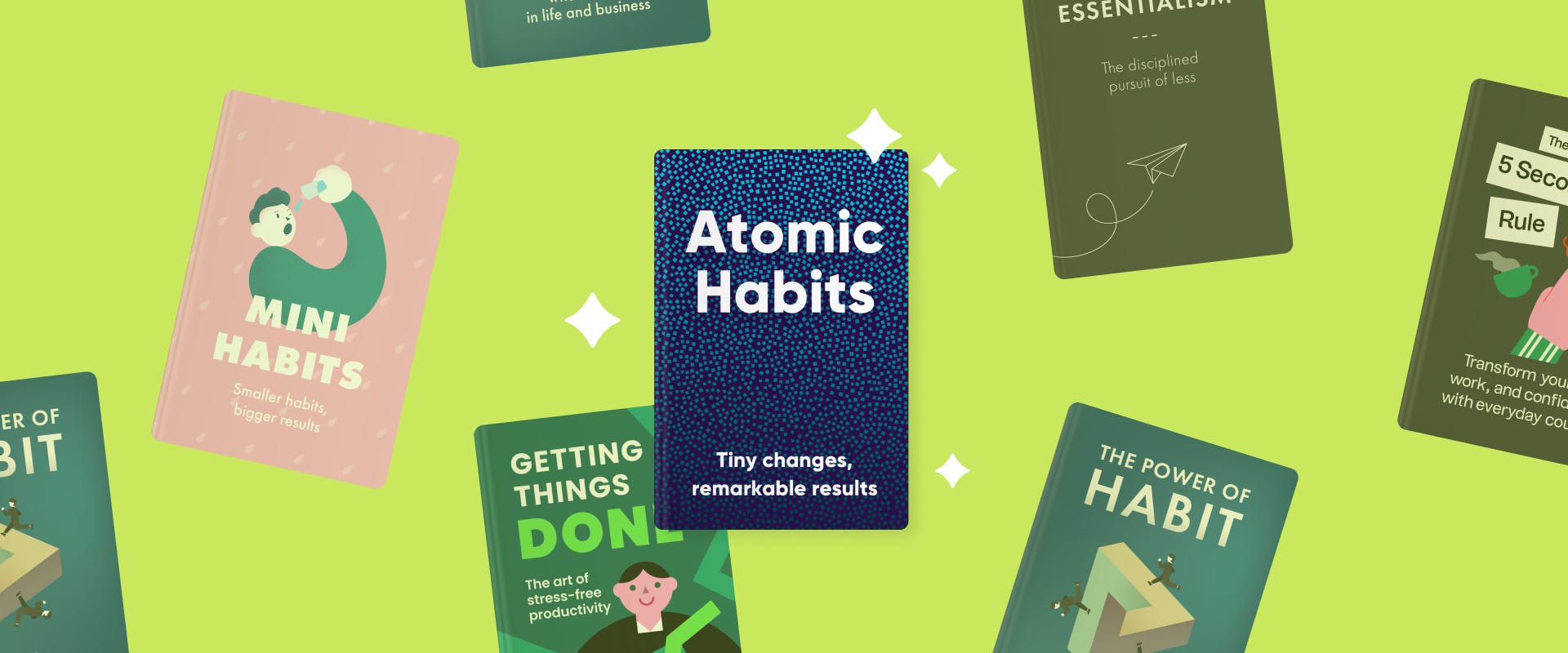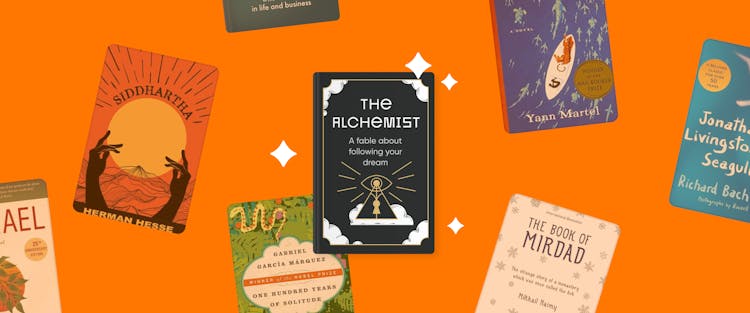Are you seeking to shift your life's trajectory through habit transformation, similar to what "Atomic Habits" inspired? Look no further. This straightforward guide offers book recommendations of titles similar to "Atomic Habits" that resonate with James Clear's ethos of incremental change, offering practical wisdom for those eager to evolve daily routines and fortify personal development.
The idea behind "Atomic Habits" by James Clear
At its core, "Atomic Habits" by James Clear is about the transformative power of small, consistent changes in our behaviors. The book emphasizes that tiny adjustments accumulate to yield significant results over time. Clear illustrates how to break down complex goals into manageable actions, creating good habits and eradicating bad ones. He also explains the importance of the environment in shaping habits and provides strategies for making habit formation easier. Ultimately, "Atomic Habits" offers a practical guide to making incremental improvements that lead to lasting personal growth.
Small steps for big results
Embarking on a journey to cultivate new habits can often be most effectively accomplished by starting with modest, incremental steps that lead toward significant achievements. For example, if the goal is to establish an exercise habit, beginning with brief strolls can act as the cornerstone for developing a routine of regular physical activity. This approach allows you to lay down strong foundations through simple yet steady behaviors, which gradually evolve into more profound habit alterations.
As these small but aligned actions are performed consistently over time, they substantially enhance your habits' robustness and play a crucial role in solidifying overall habit development.
If, empowered by this book, you're wondering what you can read after "The Atomic Habits," we recommend looking into the following must-read nonfiction titles on habit formation and self-improvement.
14 best books to boost your personal growth journey
We've created a carefully curated selection of 14 self-help books that echo the core principles found in "Atomic Habits." These titles provide valuable perspectives on personal development, the formation of habits, and increasing productivity. Deepen your understanding of habit development and enhance your journey toward personal growth with books similar to "Atomic Habits".
1. "Mini Habits: Smaller Habits, Bigger Results" by Stephen Guise
"Mini Habits: Smaller Habits, Bigger Results" by Stephen Guise introduces the concept of mini habits as a strategy for behavior change. Guise emphasizes the importance of consistency over intensity, suggesting that small, daily actions are more sustainable and effective for creating lasting habits. The approach is based on the idea that the brain resists change, so by starting with micro-commitments, we can bypass this resistance and build a powerful habit-formation process. "Mini Habits" provides a practical guide for anyone looking to make positive changes without the overwhelm that often accompanies larger goals. That is why this book is high on our list of good books on personal growth and forming positive habits.
Similarities between the books:
Advocacy for the power of small, consistent actions to achieve significant life improvements;
Emphasis on the importance of starting with small steps that are easy to achieve and gradually building upon them;
Focus on the incremental nature of habit formation, highlighting that small changes accumulate over time;
Offered strategies for overcoming the mental barriers that can prevent us from taking action toward our goals.
2. "Getting Things Done" by David Allen
"Getting Things Done" by David Allen is a productivity method that helps individuals understand habits and organize and manage their tasks and responsibilities. The system is designed to free your mind from remembering tasks by capturing them externally and breaking them down into actionable work items. Allen's approach encourages regular review and updating of tasks to keep your focus clear and stress levels low. The method facilitates effective task execution by emphasizing the importance of context, priority, and immediacy of action.
Similarities between the books:
Advocacy for the power of systematic approaches to improve personal productivity and well-being;
Emphasis on the importance of breaking down tasks and habits into smaller, more manageable parts;
Actionable strategies to help readers overcome the mental barriers that hinder productivity and habit formation.
3. "The Power of Habit" by Charles Duhigg
"The Power of Habit" by Charles Duhigg is a well-known bestseller and a compelling exploration of how habits are formed, how they function, and how they can be transformed. The book explores the science of habit creation in both individuals and societies, revealing the patterns that drive our behaviors. Charles Duhigg introduces the concept of the "habit loop," which consists of a cue, a routine, and a reward, and he explains how understanding and leveraging this loop can lead to significant changes in one’s life helping them live up to their true potential. “The Power of Habit” emphasizes that by identifying and altering the components of these loops, individuals and organizations can dramatically improve their habits.
Similarities between the books:
Emphasis on the profound impact that habits have on our daily lives and overall personal development;
Insights into the psychological patterns that underpin habit formation, offering strategies to break bad habits and establish good ones;
The concept of incremental improvement, underscoring the idea that minor adjustments can accumulate to produce notable outcomes;
Practical framework for understanding how habits work and how to harness them to foster personal development and productivity.
4. "Make Your Bed" by Admiral William H. McRaven
In "Make Your Bed," Admiral William H. McRaven presents a compilation of life lessons derived from his Navy SEAL training, encapsulated into a simple daily habit: making your bed. The book outlines the transformative impact that small, everyday actions can have on a person's life, fostering a sense of accomplishment and order. McRaven's narrative intertwines personal anecdotes with practical advice, emphasizing resilience, honor, and commitment. The core message is that even the most mundane tasks, when done right, can ripple out to inspire larger changes.
Similarities between the books:
Stress on the significance of small, consistent actions in achieving broader life goals;
Advocacy for the establishment of good habits as a foundation for personal success and discipline;
Practical strategies for habit formation that can be applied to various aspects of life, including personal and professional development;
Emphasis on the proactive approach to life's challenges, suggesting that taking control of our habits can lead to greater control over our lives.
5. "The One Thing" by Gary Keller and Jay Papasan
This insightful book champions the idea that narrowing your focus to one single task can exponentially improve your productivity and success. Keller and Papasan offer valuable insights into the benefits of prioritizing one thing at a time and the positive ripple effects this can have on all areas of life. They provide actionable steps to identify your most important task and ensure that it receives the attention it deserves at the present moment.
Similarities between the books:
Emphasis on the importance of focus and dedication to personal growth and mastery;
The idea that success comes from pursuing a singular, defining goal or task;
Belief in the power of simplicity in achieving profound results;
Encouragement to the readers to prioritize their actions based on what is most impactful to their lives and journeys.
6. "Essentialism: The Disciplined Pursuit of Less" by Greg McKeown
"Essentialism: The Disciplined Pursuit of Less" by Greg McKeown is a book that encourages readers to focus on what is truly essential in their lives, eliminating the non-essential to make the most of their time and effort. It's about finding the most meaningful tasks and committing to them with the discipline to say no to everything else. This philosophy complements the principles in "Atomic Habits" by advocating for simplicity and the power of routine in personal development.
Similarities between the books:
Stress on the importance of focusing on small, manageable tasks that lead to significant life improvements;
Emphasis on the elimination of the non-essential, allowing for more dedicated focus on habits that truly matter;
Strategies for systematic habit formation and execution, ensuring that these habits become ingrained in our daily lives.
7. "The 5 Second Rule" by Mel Robbins
"The 5 Second Rule" by Mel Robbins offers a straightforward technique to break through hesitation and act with confidence and courage. This book presents a unique five-second countdown strategy to empower decision-making and initiate action. By implementing this simple rule, readers can overcome procrastination and self-doubt, leading to more fulfilling and productive lives.
Similarities between the books:
Emphasis on the importance of taking immediate action to foster habit formation and personal growth.
A simple, practical tool that can be integrated into daily routines to help break the cycle of inaction and procrastination;
Alignment on the concept that small behavioral changes can lead to significant life improvements over time.
8. "Indistractable" by Nir Eyal
"Indistractable" by Nir Eyal delves into the psychology of attention and the challenges of the digital age that distract us from our goal to form good habits and break bad ones. It offers actionable advice on how to harness focus and align daily actions with our intentions. The book is a practical guide for those seeking to become more efficient in a world full of interruptions.
Similarities between the books:
Emphasis on the importance of consistent daily actions in achieving long-term goals;
Recognition of the role of environment in facilitating or hindering habit formation;
Practical strategies to overcome the mental barriers to productivity.
9. "What the Most Successful People Do Before Breakfast" by Laura Vanderkam
"What the Most Successful People Do Before Breakfast" by Laura Vanderkam explores the morning routines of highly successful individuals and how these early hours can influence productivity and well-being. Vanderkam provides cutting-edge research and strategies for maximizing this crucial time of day, arguing that the quiet hours of the morning can set the tone for an effective and fulfilling day. By examining the habits and tactics of successful people, this book offers practical advice on how to transform your mornings into a powerhouse of personal growth and achievement.
Similarities between the books:
Emphasis on the importance of routines and habits in achieving personal success and long-term goals;
Actionable strategies for optimizing daily life;
The idea that structured and intentional behavior can lead to profound life changes.
10. "The Science of Self-Discipline" by Peter Hollins
"The Science of Self-Discipline" by Peter Hollins unravels the complexities behind self-discipline and its crucial role in forming enduring habits. Through a blend of psychological insights and practical advice, the book guides readers on mastering willpower and overcoming procrastination. Hollins lays out a blueprint for structuring one’s life to cultivate success through disciplined actions. This book is an indispensable resource for anyone seeking to integrate self-discipline into their habit formation journey.
Similarities between the books:
Emphasis on the significance of small, consistent actions for achieving substantial improvements in life;
Stress on the importance of overcoming mental barriers such as procrastination to establish and maintain positive habits;
Actionable strategies for readers to systematically build and reinforce their habits for lasting change.
11. "The Happiness Advantage" by Shawn Achor
"The Happiness Advantage" by Shawn Achor delves into the idea that a positive mindset can help you achieve greater success in work and life. The book explains evidence-backed strategies for cultivating happiness and demonstrates how this shift in perspective can increase productivity and performance. By changing our internal narratives, we can rewire our brains for positivity and, in turn, reap the benefits in all areas of our lives.
Similarities between the books:
Both authors agree that small, consistent actions can make a big difference;
Both books emphasize that our habits and mindset lead to our personal and professional success;
They offer practical, science-based strategies for improving our daily lives through deliberate habit formation and a positive outlook.
12. "The Slight Edge" by Jeff Olson
"The Slight Edge" by Jeff Olson advocates for the incremental approach to achieving success. Olson presents a new perspective on how our daily choices lead us toward the life we aspire to or failure by default. Its philosophy echoes the principles of "Atomic Habits" in recognizing the power of small, consistent actions.
Similarities between the books:
Both emphasize the compound effect of daily habits over time;
Each book suggests that small, manageable actions lead to significant life changes;
They share the idea that success is the product of daily disciplines, not overnight transformations.
13. "The Habit Blueprint" by Patrik Edblad
"The Habit Blueprint" by Patrik Edblad provides a straightforward, actionable plan for habit formation in 15 steps. This great book is guiding readers to help you establish habits that are effective and enduring. It simplifies the process of habit development by breaking it down into small, manageable actions, making it easier to create lasting change.
Similarities between "The Habit Blueprint" and "Atomic Habits":
Both books emphasize the power of small, consistent actions in creating significant life changes.
Each offers a step-by-step approach to developing better habits.
They advocate for the importance of starting with manageable steps to build a strong foundation for habit formation.
Strategies are provided to help overcome mental barriers to change, ensuring habits stick in the long term.
14. "Designing Your Life" by Dave Evans and Bill Burnett
"Designing Your Life" by Dave Evans and Bill Burnett is a unique approach to building a well-lived, joyful life by applying design thinking principles. It encourages readers to prototype different paths and create a meaningful and fulfilling life. This great book provides the tools to build your way forward through intentional life design.
Similarities between the books:
Both books encourage an iterative process of incrementally making small changes and adjustments to improve one's life;
They focus on actionable steps and emphasize the importance of clarity in setting goals and forming habits that align with one's values and aspirations;
Each book offers strategies for overcoming the inertia of inaction.
Implementing new habits in daily life
Embarking on the journey to develop new habits can be tough, yet it is a worthwhile endeavor. Here are four strategies based on the books we recommended to help you implement new habits in your daily life:
Start with mini habits: As suggested by Stephen Guise in "Mini Habits: Smaller Habits, Bigger Results," initiate small, almost effortless actions that can be performed daily without significant resistance. This approach helps to bypass the brain's natural resistance to change and can lead to the formation of powerful, long-lasting habits.
Employ the 5 second rule: Mel Robbins in "The 5 Second Rule" advocates for a simple countdown technique to counteract procrastination. When you feel hesitation, count down from five and take action immediately, which can kickstart the process of habit formation and help maintain momentum.
Focus on one thing at a time: Echoing the principles from "The One Thing" by Gary Keller and Jay Papasan, prioritize your habits by focusing on one at a time. This concentrated effort ensures that you give your full attention to developing a particular habit, making it more likely to stick.
Design your environment: Drawing from "Atomic Habits," create an environment that supports your new habits. Arrange your surroundings to minimize distractions and make the cues for your new habits visible, thereby making it easier to maintain your focus and stick to your intended behaviors.
Overcoming procrastination
For those readers who are particularly struggling with procrastination, here are the best books we recommend to study and implement that offer strategies to tackle this common obstacle:
"Mini Habits: Smaller Habits, Bigger Results" by Stephen Guise - This book suggests starting with micro-commitments to bypass the brain's resistance to change, which can be particularly useful for those who procrastinate;
"Getting Things Done" by David Allen - Allen's method is about organizing tasks in a way that makes them manageable, which can help prevent the feeling of overwhelm that often leads to procrastination;
"The Power of Habit" by Charles Duhigg - Understanding the habit loop and how to manipulate it can provide insights into why we procrastinate and how to overcome it;
"The Science of Self-Discipline" by Peter Hollins - This book offers a blueprint for mastering willpower and taking action for those who procrastinate due to a lack of self-discipline.
These titles provide a range of strategies and insights that can help you overcome procrastination and establish more productive habits.
Additional recommendations for tracking progress
For those who are particularly focused on tracking the progress of their habits, we recommend "The Compound Effect" by Darren Hardy and "Measure What Matters" by John Doerr. These nonfiction books explain the importance of tracking your progress on your way to self-improvement.
Hardy's book emphasizes the incredible results that can come from the accumulation of small, consistent actions, and he provides practical advice on how to track these actions to see their compounding effects over time. Doerr's book, on the other hand, introduces the concept of Objectives and Key Results (OKRs) as a framework for setting and achieving goals, with a strong emphasis on tracking progress to ensure alignment and engagement throughout the process of habit formation.
Read the summary of "Atomic Habits" with the Headway app
As you navigate the path of personal growth, consider using Headway as a supportive tool. It features:
A vast collection of more than 1600 summaries for both text and audiobooks that can be digested in just 15 minutes;
An array of subjects spanning productivity, health, career advancement, and financial management;
Availability in English and Spanish to reach a wide audience.
With Headway, you can read "Atomic Habits" by James Clear in a concise summary format— perfect for those seeking either an introduction or a concise refresher on the influential power habits wield.
Frequently Asked Questions
What book should I read after reading "Atomic Habits"?
Should you find yourself fascinated by "Atomic Habits" penned by James Clear, consider exploring the titles like "Designing Your Life" by Dave Evans, "Getting Things Done" by David Allen, and "What the Most Successful People Do Before Breakfast" by Laura Vanderkam. Additionally, we also recommend adding to your list of books Oliver Burkeman’s "4,000 Weeks," Jake Knapp and John Zeratsky’s "Make Time," Gary Keller’s "The One Thing," Greg McKeown’s "Essentialism," BJ Fogg’s "Tiny Habits," Cal Newport's "Deep Work," and Stephen R. Covey's "The 7 Habits of Highly Effective People."
Is Atomic Habits for ADHD?
Certainly, "Atomic Habits" book can aid individuals with ADHD by offering techniques to divide tasks into tiny, achievable increments. This approach simplifies the process of addressing tasks that might otherwise seem daunting.
The practice of implementing daily activities and minor habits can lead to substantial impacts over an extended period.
What is the significance of habits in personal growth?
By understanding and altering our habits, we can profoundly boost personal development, which positively affects our productivity, emotional health, and the entirety of life’s quality.
How can the environment influence habit formation?
Establishing an environment that is nurturing and free from obstacles aids in developing good habits. Eliminating any distractions can also facilitate the formation of new habits.
What are some strategies for overcoming procrastination?
To overcome procrastination, start by developing simple habits and specific routines. Techniques like the 'Nothing Alternative' and focusing on the next actionable step can help you begin tasks and maintain momentum.





















